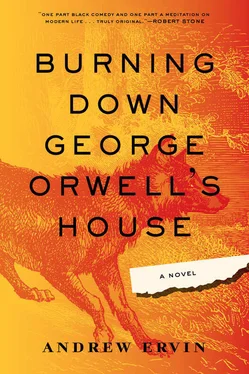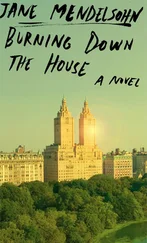She removed the mac from the hook again, crammed it into the backpack, and handed him the whole thing. “The next time you’re at The Stores, pick yourself up a decent pair of wellies. I threw away those ugly boots of yours.”
Sure enough, his boots were missing from the mudroom. “What do you mean you threw them away? Those were very expensive!”
“I put them in the bin. They’re shite at any stupid price. They might be right for the grueling conditions of inner city Chicago, but on Jura they’re as useful as nail polish on a snake.”
“What am I supposed to wear in the meantime?”
“What am I supposed to wear in the meantime? Jesus, do you listen to yourself? It’s not my problem — your plimsolls, I suppose.” He looked at her blankly. “Trainers? Sneakers?”
“I have a better idea,” Ray said.
The garbage pail at the back of the house overflowed with over a month’s worth of refuse. He needed to take it to the dump somehow. He retrieved his boots from the muck.
As much as he wanted to climb the Paps, they were way too far away to reach in one afternoon. They headed in the opposite direction, up toward Kinuachdrach. The air was aromatic with sage and wildflowers and hay. They walked in silence, but it became clear that Molly had something to get off her chest. He didn’t push it.
For the first time in months, his muscles seemed to be loosening. Was this what it meant to relax? It had been a long, long time. Every so often he and Helen used to get in the truck and drive up to the woods in northern Illinois or Wisconsin. They could walk for long, tranquil hours. Being on Jura brought back some of that joy, but with Molly there existed a different and tenser variety of shared silence.
After something like forty minutes or an hour, a damp breeze kicked up. He really had gained a new sense of time. His body felt more responsive to the natural environment than to the lumbering journey of an hour hand around the face of a wristwatch. The wind sent the grasses rippling in long waves. The cool air mitigated the heat beating down on his face and the part of his neck not covered by his beard, which had again assumed an unruly life of its own. Molly had remarked that he looked like a second-rate hippie guru capable of mass murder or a millionaire jam-band guitarist trying to resemble his unwashed fan base.
They arrived in Kinuachdrach and he knocked on Miriam’s door, but she didn’t answer. A cat stirred in the window and the dog growled at them from its barbed-wire cage. “Too bad she’s not in,” Molly said. “She bakes the best scones in Scotland.”
The pickup truck full of pig shit was parked next to another house, one crumbling and half boarded up. “Who lives there?” Ray asked.
“That’s Mr. Harris. He keeps to himself.”
“He gave me a ride to Barnhill the other day.”
“Are you having a laugh?”
“He said he knew who I was.”
“He stops by The Stores and even the lounge from time to time, but hasn’t spoken more than a sentence to anyone in two years. We’re best to leave him alone.”
They followed the path up to a summit, from where they could see the mainland and make out several of the neighboring islands. It was Ray’s first real view of his surroundings. A lighthouse or bunker of some sort stood vigil on one of the islands. The shadows of clouds spotted the land with fast-moving shapes. He stood at the centermost point of the entire universe and understood, finally, that he was on the Isle of Jura, that his physical experience of the natural surroundings and his mental image of the map were one and the same. He stayed put for a moment while Molly marched ahead; then he jogged to catch up. Beyond the summit, a path plummeted toward a gulf where she pointed to something in the water. “See that?” she asked.
A series of wooden docks housed some small boats, which looked perfect for fishing or even for a short jaunt over to the mainland. “Not really.”
“See where the water’s a bit darker? That’s the Corryvreckan.”
They went down to the quay and sat with their legs hanging over the water. Gigantic seabirds screeched at them and broke the surface of the water in perilous dives. Ray wanted to ask Molly a million questions — about Jura, about who might still remember Orwell, about her black eye most of all. They watched the sunlight sparkle on the water until the smell of the air changed and became almost metallic. Molly pulled a raincoat from the backpack. She put it on, but it was several sizes too large so she had to roll up the sleeves. When she stood it hung to her knees like a dress. He pulled the other jacket on. It felt like wearing a second skin of plastic wrap. Sweat poured into his eyes when he sat again.
The rain came at once and from nowhere. Every drop sought his attention. The sky still teased them with sapphirine clarity, but rain fell like it wanted to submerge the island again until the tips of the Paps protruded from the sea to form three smaller and even less populated islands. He thought that the weather would frighten Molly off, that she would turn around and return to Barnhill, but no. She stayed seated, impervious to the weather, watching the sound absorb the deluge until he couldn’t stand her silence any longer. “Is there something bothering you, Molly?” he asked. He was full of stupid questions.
“What could possibly bother me about spending my entire life trapped on a medieval island completely devoid of culture?”
He didn’t know what to say. He had felt the same way, at her age, about living in the Illinois cornfields, but there was no way to explain that. She would have to figure it all out on her own. “You’re only seventeen, and you’re probably not as trapped as you think. Your father — and I will grant you he is a raging asshole — in his own messed up way he has your best interests at heart. There’s no reason you’ll need to stay on Jura forever.”
“I knew you would take his side!”
“Here’s the thing,” Ray said, hoping that something helpful and encouraging would come to mind. He waited. “Thinking in terms of sides is never useful — there really aren’t any binary oppositions. Nothing is entirely black-and-white or good-and-bad.”
“That sounds to me like lame relativism.”
“Let’s go back,” he said. He needed nothing more than a tall glass of single malt to warm himself up with. They started the return trek to Barnhill. “It’s not relativism, it’s specificity. Every thing needs to be considered in itself instead of in relation to some false negation of it. Try to think of your situation from your father’s point of view. I’m not saying he’s right — I mean, look at your eye — but terms like right and wrong are beside the point sometimes.”
Their boots splashed in the mud. Ray’s toes grew wet and sent a cascade of prickles up his leg.
“Aye I get all that, but what if he doesn’t have my best interests at heart? I have every reason to believe he is a selfish arsehole who will do everything he can to satisfy his own needs. This island and our traditions are more important to him than I am, so where does that leave me?”
“It leaves you stuck on Jura, I guess, until you decide you’re ready for art school or whatever it is you want to do. As much as you want to moan and complain, I know that a part of you loves it here. A big part of you.”
“That doesn’t mean I can’t hate it too — you said so yourself.”
“Right, so tell me what you love about Jura.”
“The history, I guess. People have lived on this island since the Stone Age.”
“What else?”
“I don’t know. In many ways, this may be the strangest place on earth. When I leave — and I am going to leave — I’ll miss the eccentricity here. We get all the telly programs from London and America, but we’ve also managed to maintain a unique way of life. I do love that about this place, but I also hate it. Is that okay?”
Читать дальше












